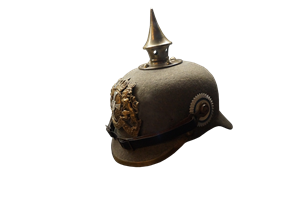PDF chapter test TRY NOW
As it grew late, a few more songs were traded around the fire, and then all joined in for – I am not lying to you – “Auld Lang Syne.” Then we parted with promises to meet again tomorrow, and there was even some talk of a football match.
I told him gently, “That you must ask your emperor.”
As the Germans and the Britishers had difficulty while communicating, they swapped gifts with each other. The Britishers exchanged their things with the Germans. They gave tea to the Germans and got back their coffee. They gave the Germans the corned meat, and the Germans returned them their sausage. Uniform badges and buttons were exchanged with one another in the symbol of happiness and memories. One of the boys from the Britisher’s team went away with a spiked helmet. The term “spiked helmet” refers to a headgear worn in the 19th and 20th centuries by the Prussian and German military, firefighters and police. Later, the British soldier exchanged his jackknife for a leather equipment belt. He gave it in the hope that it would serve as a momenta when he returned home.

Spiked Helmet
It was late in the night; the Germans and Britishers sang a few more songs by sitting around the fire. Then the British soldier said that everyone joined together and sang on that Christmas eve. He says that he was not lying; these were the real incidents on Christmas Eve. Later, they sang “Aung Lang Syne” . It is a Scots poem written by Robert Burns in 1788 and set to a traditional folk song. It is traditionally sung on New Year’s Eve in many English-speaking countries. Then they bid goodbye and promised that they would meet each other the next day. Not only they were exchanging gifts and singing songs they had also discussed the football match.
When the British soldier was about to return to his trenches, an older German soldier grabbed his arm. The old man asked him, “why can’t we all just go home and enjoy peace?” The man would have made the statement because the enemies became the friends now and they exchanged lovely gifts, songs and chats with each other. After seeing the harmony, the old man might have posed this question to the British soldier. After listening to the old man’s question, the British soldier said gently that he had to ask this to his emperor. The British soldier made the statement because the captains were the ones who were the decision-makers. As the man grew older, the old man thought that more than fight, peace was a better thing.
Meanings of the difficult words:
| S.No | Words | Meanings |
| 1 | Converse | Engage in conversation |
| 2 | Exchange | An act of giving one thing and receiving another especially of the same kind in return |
| 3 | Sausage | An item of food in the form of a cylindrical length of minced pork or other meat encased in a skin, typically sold raw to be grilled or fried before eating |
| 4 | Clutch | Grasp something tightly |
| 5 | Emperor | A sovereign ruler of an empire |
